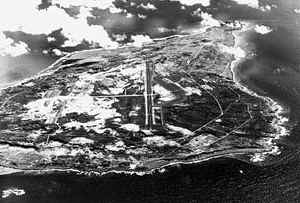


IWO JIMA![]()

![]()
Iwo Jima was the first native Japanese soil invaded by U.S Forces in W.W. II
More US Marines earned the Medal of Honor on Iwo Jima than in any other battle in US History.
36 days of fighting on Iwo Jima caused 25,851 US casualties establishing itself as one of the bloodiest battles in modern day history.
6,825 Americans were killed. 22,000 Japanese soldiers died defending 'The Sulphur Island"
In the fall of 1944, Iwo Jima commander Gen. Tadamichi
Kuribayashi, oversaw the construction of underground defensive
positions 35 feet deep on Iwo for protection against bombing and gunfire
Iwo is shaped like a pork chop, with the 546-ft Mount Suribachi on its southwest point.
In early 1942, Dad left Illinois a teenager. He returned four years later a man. And with him... memories that would haunt him. Memories, bullet fragments, and shrapnel from a Japanese grenade - all of which he carried with him until the day he died. When younger, I would ask dad about his time in the war. Like so many other veterans, he said almost nothing. I did not understand at the time, but as I got older I learned that there is a pain so deep even time cannot fade it's effect. Speak of Iwo Jima , Saipan, Guadalcanal, Pellelieu, or Tarawa with a WWII Marine Veteran and you will know what I mean. Dad fought in all four of the historic Fourth Marine Division's invasions ( Roi -Namur - Saipan - Tinian - Iwo Jima ). He was first wounded on Feb.19, D-Day on Iwo Jima. With his wound dressed, he soon returned to battle - fighting on until early March. His time on Iwo ended with the explosion of a grenade, still his sacrifice didn't end there. For the rest of his life, he struggled with the pain from his wounds as well as permanent hearing loss from the concussion of an enemy grenade. One of my friends once asked me if my dad was a hero. He never received the Medal of Honor , but yes, he was a hero to me. I can also count every Marine who fought and died beside him, and all Marines in the Pacific Campaign as my heroes. Add to them the brave soldiers who served in the European Theater. As I do more research into this point in time, I am struck by the valor, the gallantry, and the sacrifice -so many who made the ultimate sacrifice. We do well to honor these fine men. May we never forget the price that was paid for our freedom.

Sgt Bright was in one of the first waves - (1st Battalion, 23rd Marines.)
"RCT 23 landed on Yellow Beaches at 0902 with two battalions abreast, 1/23 on the left and 2/23 on the right. The attack of this Combat Team was of necessity a direct frontal assault against well-organized positions on commanding ground. "
22,000 Japanese soldiers were dug into a network of tunnels consisting of three levels. Naval and air barrages were largely ineffective as their forces had spent many months constructing connecting bunkers and covert artillery positions. Unlike previous island defense strategies, the Japs hid underground in the tunnels, randomly surfacing in hundreds of hidden concrete bunkers. The defenders moved underground from bunker to bunker day and night among Marine positions In addition, the Japanese fired on positions from Mt Suribachi where they had previously spent weeks zeroing their sights in on. Yet, in spite of horrific casualties of officers and men, after 36 days the island of Iwo Jima was declared secure. It was about these Marines who fought so gallantly that Pacific Theatre Commander Admiral Nimitz made these now-famous remarks: "Uncommon Valor Was A Common Virtue".
The 4th Marine Division was an integral part of America's "March to Japan". Four streamers decorate it's battle flag, signifying it's part in not one but 4 major invasions. I am immensely proud to be the son of a United States Marine.